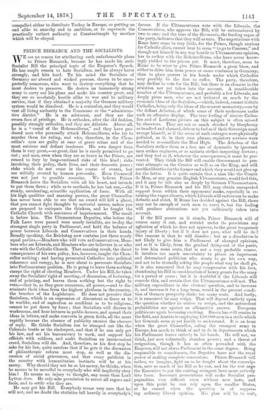TOPICS OF THE DAY.
THE MURDER OF MEHEMET ALI. THE murder of Mehemet Ali, recently Plenipotentiary for Turkey at the Berlin Congress, and at the time of his death Special Commissioner in Albania, may prove to be an event of grave importance. It brings before the Governments of the Continent in a most dramatic way a truth long since recog- nised by those who know Turkey, but usually denied or for- gotten by diplomatists,—that the Sultan is not the indepen- dent Sovereign of his own territories. He shares his power with the fierce and uncivilised, though brave and hardy, caste which originally won him his dominion, and has ever since formed the dominant caste in the old Eastern Empire. He is in the position in which a ruler in Ireland would be if his power rested solely on the Orangemen. So long as the Ottomans, and the clans which, like the Arnauts, are Ottoman in feeling, agree in the main with the Sultan, he is absolute, can raise or destroy any individual, can tax his people at pleasure, can declare peace or war, and can make any arrange- ments with foreign Powers, but the moment they disagree he is powerless, or powerful only to order troops to crush rebels with whom they are at least as likely to sympathise. No order, however necessary, or just, or imperative, which interferes with the ascendancy of the caste is ever obeyed. If it is a general order, directing, like the Hatti Humayoon, that the Christians shall enjoy equal privi- leges with the Faithful, the Cadi reads it, quotes a text of the Koran, and rejects Christian evidence as if it had never been passed. If it is a particular order directing that Mahommedan rioters be punished, the Pasha reads it reverently, issues the instructions, and either arrives on the scene too late, or finds that the guilty parties were all Christian rayahs. If it is an order under a treaty to surrender ascend- ancy in such-and-such a district, it is met by active resistance, which succeeds or fails, as the case may be, but is never punished without European interference. This restriction on the Sultan's power has been known to the Pashas for years, it has been utilised by the fanatical among them to counteract the Palace and to defeat reforms, and it has gradually been sys- tematised until the caste has become a militia, to be called out when terror could not be applied through regular troops. When so called out, the peasantry expect connivance, and all restrictions on their action are at an end, and their unarmed victims suffer like citizens in a captured town, or like the rich in a Red 6neute. They are left to a mob which is also a soldiery. The Sultans, whose interest is obedience, have from time to time perceived the danger of this system, and have endeavoured to control the caste, but usually in vain, until now that Turkey has been defeated, and territories have to be ceded, and ascendancy has visibly to be abandoned, the Sultan finds himself almost powerless. He surrenders Batoum, and his subjects threaten to murder the Pasha who carries out his orders. He signs a Treaty allowing an occupation of Bosnia, and the Bosnian Begs resist to the death the entrance of the occupying army. He agrees to the garrisoning of Roumelia by Russians, and the Mussulmans of the Rhodope attack the invading strangers. He signs away a morsel of Epirus and Thessaly, and the caste arms itself to keep down the expectant Christians. He sends a trusted officer to rectify the frontier of Albania, and the Albanians order the officer to attack the Christians, and on his refusal murder him and his suite in broad day,—without battle says Vienna, after strenuous resist- ance says Constantinople, where apparently the resistance is held to extenuate the massacre. There was no pretence of any other cause for the attack. There was no pretext of any personal hatred to Mehemet Ali, a coarse but genial man, quite faith- ful to his cause. The dominant caste were not going to obey orders they did not like, and intimated their independence by slaughtering the great official who bore them. It is extremely improbable that they will be punished. The Sultan has still brave troops, but many of his counsellors sympathise with the assassins ; it is doubtful whether the soldiers will act heartily against them, and quite certain that in despatch- ing them from the capital, the Palace will run risks which its inmates dread even more than cessions of territory which many of them, in their ignorance of the condition of the Empire, and even of geography, scarcely perceive. The spirit of mutiny, according to the able correspondent of the Standard, who is in no way either Liberal or anti-Turk, is universal, and the Sultan is paralysed, if indeed the dynasty itself is not at its last gasp. He believes that it is, and predicts its extinction if an Ottoman Parliament is reassembled and though he may in this prophecy be too much influenced by the ideas of the West, and confuse the brutal frankness of speech which is from time to time characteristic of Oriental malcontents with a desire for radical political change, he may also be right. "With the House of Othman, Islam falls," is a belief which has for centuries protected the dynasty ; but if Islam has fallen—and that is the fear, if not the full belief, of the caste—why, in Mahommedan opinion, should men die for a House against which Fate has openly issued its decree ? God being Mussul- man, Mussulmans can be defeated only when their leaders sin. If the House falls, its territory will be resolved at once into a group of anarchical States, in Europe and Asia alike, in each of which a fierce Mussulman caste will strive for and obtain ascendancy. They are soldiers born, their creed is on the side of battle, and if the times were propitious, and power in war- not so dependent upon outlay in war, they might again develop a conqueror. If, on the other hand, the House stands—and this we believe it will do, custom and Euro- pean pressure being alike in its favour—its prestige must inevitably and swiftly disappear. The Sultan can no longer carry out his promises. The idea at the bottom of the Berlin Treaty and of the Convention with Great Britain is to leave the Sultan an Asiatic Sovereign, in possession of Con- stantinople, and to indicate whither, in the general interest of Europe, his European provinces must gravitate. That settle- ment is, we suspect, not altogether disagreeable to the Sultan and the Pashas, who, with Asia to tax and Macedonia and Albania to furnish soldiers, would, as they do not intend to pay any bonds, live tolerably luxurious lives. The condition of this arrangement is, however, that the Sultan should have power to carry it out, and what with the War party in his own capital, the imperfection of his title—which is serious, while a party believes Murad not to be insane, but only liable to de- lirium—and the mutiny of the Mahommedan landholding militia, it is now evident that he does not possess it. It is impossible for a Government to make an agreement with him, still more a secret agreement, for no treaty signed by him binds his caste, and a secret treaty could not be brought into operation. The officers appointed to execute it would be killed, and the Mussulman yeomanry would defend their ascendancy as if they had received no orders.
We do not care to point out the effect of this state of affairs upon the Convention of June 4th. It has become evident from a hundred signs that the Convention was either a sham, intended to reconcile the British people to the inevit- able, or a dream dreamed by the author of " Alroy," where, even more than in " Tancred," Lord Beaconsfield's permanent convictions about government in the East may be discerned. Clearly, if the Sultan cannot affront the caste in Asia Minor, he cannot reform Asia Minor ; and if he does not reform, our guarantee, which is made contingent on reform, is only waste- paper. But we wish to point out how completely this power- lessness of the central authority throws open the whole Eastern Question, and interests all Continental Powers. We English can sit still and look on, because till Egypt is touched, there is no- pressing necessity forcing us to action, but the remainder of Europe cannot. Russia must find some modus vivendi for Roumelia. The Italians are half-demented with sympathy for the true Albanians—the Christians of Albania—and fear about the destiny of a province which, in strong hands, would,, as they think, command the destinies of Southern Italy. Even we should not like to see Ireland in French hands, and Albania is nearer to Naples than Ireland to Southern England. France must have clients in the East Mediterranean ; she has chosen the Greeks, and the Sultan's inability to give the Greeks their boundary is a direct provocation. And as for Austria, Austrians are dying in heaps because the Sultan cannot—we by no means say will not—carry out his agreements. It is all very well for us comfortable English to sit here, and watch, and speculate, and propose wars of limited-liability in Central Asia, but the governing class of Austria is military. There is not a family visible above the surface without sons or rela- tives in the Army of Occupation, not one which does not feel that its members are being put to death because the Sultan is no longer capable of executing a Treaty. Hungarians feel their losses just as much as Austrians, and in the presence of the daily record of slaughter, sympathy for the Ottoman dies away. It is impossible under such circumstances that the Eastern Question should not be reopened, that Austria, Russia, and Greece should endure to see the Treaty become worthless, or that the Continental Governments should not feel themselves
compelled either to distribute Turkey in Europe, so putting an -end alike to anarchy and to ambition, or to supersede the -practically extinct authority at Constantinople by another which will be obeyed.































 Previous page
Previous page